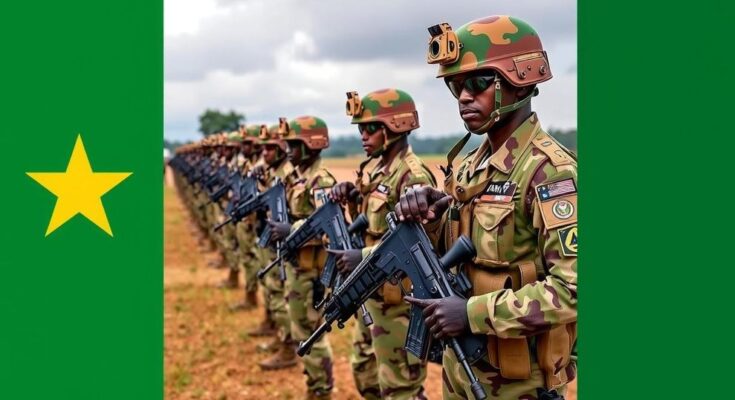The South Sudanese army has assured the safety of citizens and foreign nationals after recent gunfire in Juba, related to a clash at the residence of former intelligence chief Gen. Akol Koor Kuc. The situation is now under control, with investigations ongoing into the conflicts among military forces. Reflections on political instability highlight recent changes in leadership and postponed national elections.
The South Sudanese army has taken measures to reassure both the domestic populace and foreign nationals regarding their safety in the wake of a recent gunfire incident in Juba. The disturbances occurred in the Thongping area near the residence of former intelligence chief Gen. Akol Koor Kuc, where clashes between military factions unfolded. An official spokesperson for the South Sudan People’s Defense Forces (SSPDF) confirmed that order has since been restored and investigations into the provocation are ongoing.
The gunfire erupted around 7 p.m. and persisted for over an hour, creating concerns about the safety of citizens and diplomats in the vicinity. In response to these concerns, the spokesperson emphasized that both personal and property security for foreign nationals is assured and that the situation surrounding Gen. Kuc’s residence has been stabilized. Further inquiries are being conducted to ascertain the motivations behind the military confrontation.
The underlying causes of the conflict remain somewhat ambiguous. However, it was revealed that Gen. Kuc had recently received orders to limit his activities, and subsequent military deployments to his residence appear to relate to his prior security detail, which had been significantly reduced following his dismissal by President Salva Kiir in early October. Gen. Koor had previously led the National Security Service since South Sudan’s formation but was replaced amid a tumultuous political landscape.
The transitional government in South Sudan is currently navigating a precarious situation characterized by disputes at high levels. This incident follows the postponement of national elections that were initially slated for December, a move indicative of the instability prevalent within the administration of President Kiir, who has recently taken steps to reinforce his authority in light of ongoing tensions in the leadership.
The recent gunfire incident in Juba reflects both the political instability in South Sudan and the military tensions that pervade it. Gen. Akol Koor Kuc’s abrupt dismissal from his role as head of the National Security Service has triggered a reaction among military factions loyal to him. This situation highlights the power struggles that are common in transitional governments, particularly within the context of South Sudan, which continues to grapple with the ramifications of its independence and ongoing conflicts. The unrest underscores the challenges faced by the current administration, especially against a backdrop of postponed elections and heightened security concerns.
In conclusion, the South Sudanese army’s efforts to restore calm following the gunfire incident in Juba serves to reassure both citizens and foreign nationals of their safety. As investigations into the clash continue, the ongoing political strife, notably concerning the dismissal of Gen. Akol Koor Kuc, further complicates the fragile stability of the transitional government. This recent episode encapsulates the broader uncertainties that continue to mark the governance of South Sudan.
Original Source: www.radiotamazuj.org




